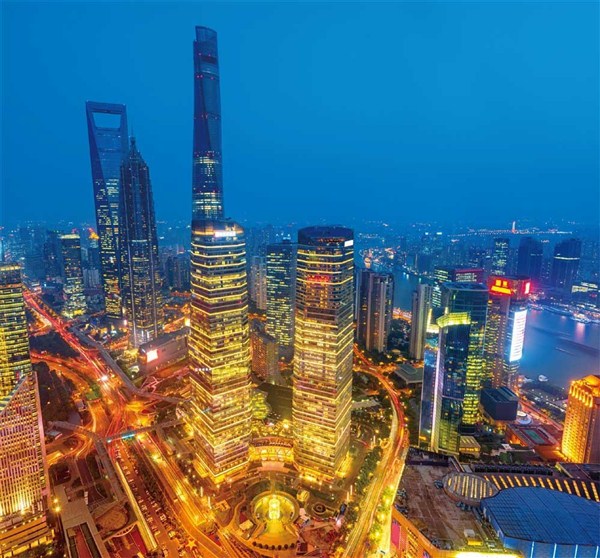
今日上海
众多公司总部驻扎浦东 推动当地经济转型发展 - 2017年02月17日
Corporate headquarters strengthen area economy

PUDONG has become home to more than 400 corporate headquarters. Among these, 265 are regional headquarters of multinational conglomerates — representing nearly half of the total number in Shanghai — while the rest are head offices or regional headquarters of domestic enterprises.
The “headquarters economy” has helped Pudong transform and upgrade its economy and enabled the area to participate in the allocation of resources both domestic and from overseas.
For international firms, Shanghai is not only a gateway to the vast domestic market but also a major player in the global economy.
Multinational enterprises take a global approach to foreign markets and production. More and more transnational corporations are taking part in the construction of the China (Shanghai) Pilot Free Trade Zone. They also act as bridges between domestic and overseas resources and markets.
Headquarters of multinational conglomerates and their local subsidiaries in Pudong recorded total revenue of more than 960 billion yuan (US$139.47 billion) last year, and paid 53 billion yuan in taxes. The sales revenues, taxes and value of international trade they generated were more than one-third of the total amount of all foreign-funded companies in Pudong.
In previous years, multinational corporations regarded Shanghai as a production and trading center, but now the headquarters economy of Pudong has shown the city’s different characteristics, said an official with Pudong New Area Commission of Commerce.
Many of them are playing an active role in the construction of the Shanghai FTZ, the official said. For example, Manpower Group has moved their regional headquarters from Hong Kong to Pudong, making it the first regional-headquarters of a human resources company to settle in the FTZ.
The Pudong-based Yuewen Group, China’s largest online publishing and eBook company, has rapidly expanded their business in Pudong.
The Shanghai UBM Sinoexpo International Exhibition Co also established its headquarters in Pudong. With the help of UBM Sinoexpo, Pudong accounts for 60 percent of Shanghai’s meetings, incentives, conventions and exhibitions market.
Moreover, enterprise headquarters work to promote innovation, entrepreneurial support, value chain development and expansion of a skilled talent pool as Shanghai builds itself into a science and technology innovation center.
As the first multinational pharmaceutical giant to settle down in Pudong’s Zhangjiang area, Roche has led the way for a large number of multinational pharmaceutical enterprises, universities, research institutes and R&D institutions. From “made in China” to “created in China,” the Roche Innovation Center Shanghai, now under construction, will be a brand-new pharma research and early development center. It will serve as the third Roche R&D center, following those in Basel and San Francisco.
It will provide space for a growing number of lab specialists to satisfy the needs of its growing local production. More than 80 percent of these specialists will be local scientists.
Infineon is developing a “win-win” strategy with China. The German semiconductor manufacturer is ploughing into the field of intelligent manufacturing to promote China’s “Made in China 2025” strategy.
At present, Infineon has 12 offices in China and three factories, three R&D centers, one logistics center and nearly 2,000 employees. The company’s revenue in China reached 1.6 billion euros (US$1.7 billion) in the 2016 fiscal year.
Shipping giants
The enterprise headquarters are continuously improving as Shanghai promotes the construction of four global centers — in shipping, finance, economy and trade.
China COSCO Shipping, which was established last year, has become the world’s largest comprehensive shipping company by capacity.
Chairman Xu Lirong said the birth of China COSCO Shipping has enhanced the status of Chinese shipping enterprises in the international shipping industry, and strengthened Chinese shipping enterprises’ globalization and international competitiveness. This has added a strong impetus to the construction of Shanghai as an international shipping center.
UPS opened its China headquarters in Pudong in 2006 and established its international aviation transshipment center at Pudong International Airport in 2008.
The center was the earliest and most advanced facility of its kind in China.
After that, other delivery companies set up their transshipment centers at the airport, which significantly increased air cargo throughput and helped the Pudong airport become the third largest freight airport in the world.
Emerging industries
Apart from traditional business sectors, Pudong’s headquarters economy is expanding toward emerging industries. Headquarters in the area are continuously increasing investment to promote the use of information technology and advances in precision medicine amid the development of the “Healthy China” strategy.
Pudong-based Winning Health has become an industry leader in the Internet plus healthcare space as China’s healthcare industry ushers in a digital transformation led by the application of information technology innovations.
Meanwhile, Thermo Fisher Scientific has carried out a number of cooperations with medical institutions in different areas, including the establishment of a joint research platform for precision medicine, joint diagnostic centers and joint training centers.
In the future, Thermo Fisher Scientific will also focus on areas including food safety, pharmaceutical and environmental protection in order to play an important role in the “Big Health” industry.

